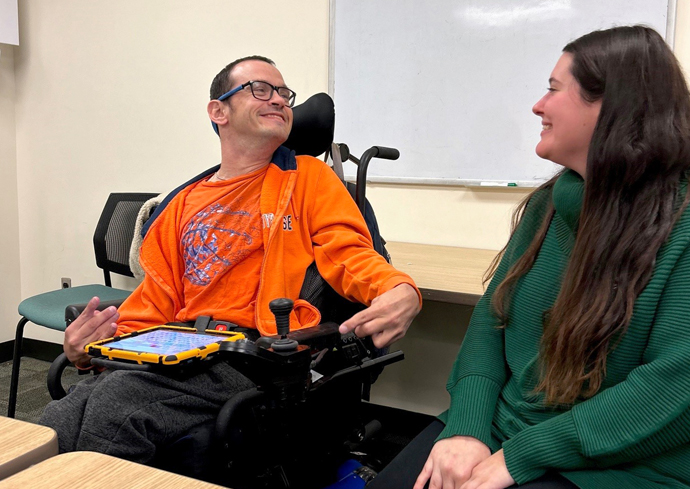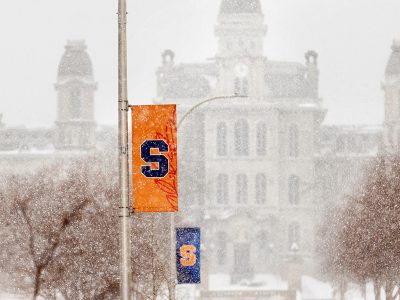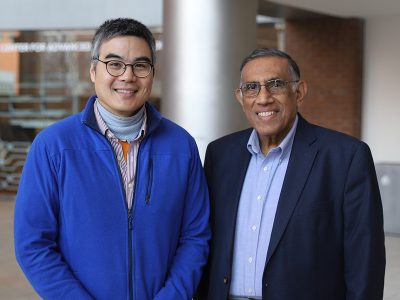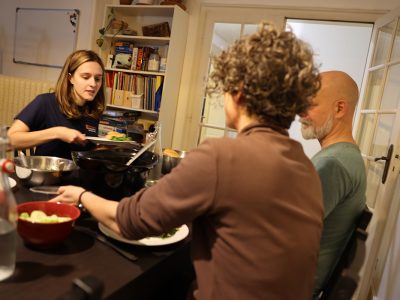Cultivating Community Through Augmentative Communication
Verbal communication is one of the most common and fundamental forms of interaction for humans. Whether it’s conversing with colleagues at work, or chatting with family members around the dinner table, on average, a person speaks around 16,000 words a day. While exchanging thoughts through language is innate to most, for those with speech disorders, the process becomes significantly more challenging.
Clinicians in the College of Arts and Sciences’ Gebbie Speech, Language and Hearing Clinic offer personal, individualized service and support to adults, children and families in need of diagnosis and treatment for a wide variety of speech-language and hearing difficulties. Among the populations they work with are clients who use Alternative Augmentative Communication (AAC) to help express themselves.
“(AAC) can be used temporarily or long-term to help people with speech and language disorders who are unable to communicate in a more typical way such as talking,” says Brianna Hammerle, assistant teaching professor in the Department of Communication Sciences and Disorders (CSD).
What is Alternative Augmentative Communication?
AAC is available in various forms, ranging from no-tech or low-tech options like pointing to pictures or letters on an alphabet board to spell out words or messages, to high-tech solutions like applications on dedicated speech-generating devices like tablets. Advanced speech-generating devices enable individuals to communicate by choosing vocabulary icons or typing messages, which the device then vocalizes.
At the Gebbie Clinic, faculty like Hammerle and CSD graduate students lead a weekly conversation club for adults who use AAC so they can practice conversational skills and expand their communication abilities.
“At each meeting, members share stories, thoughts and plans while participating in engaging and fun activities,” says Hammerle. “This allows them to grow the complexity of their language, increase efficiency with AAC use, and develop a sense of community and support through interaction with other individuals utilizing AAC.”
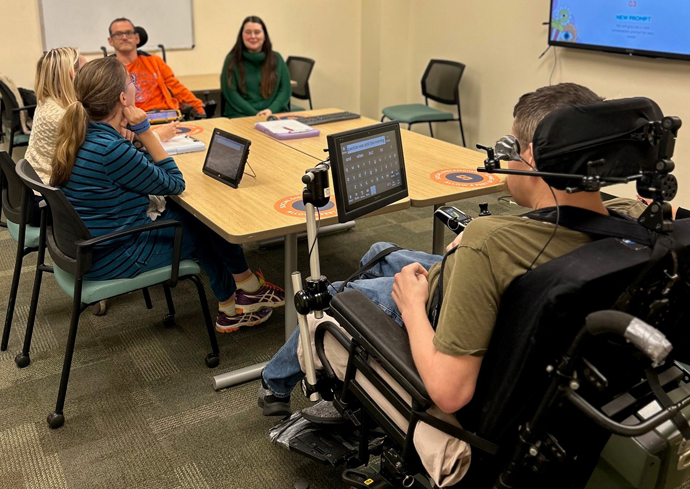
Practical Experience
Meetings revolve around a specific theme, and participants take part in various related activities, including games, trivia and guided discussions. Some recent group exercises have included filling out a March Madness bracket, participating in Syracuse history trivia and planning a cross-country road trip.
Each session is planned and facilitated by graduate students, with oversight from Hammerle and other faculty. Through this experience, students acquire transferable skills that will benefit their careers as speech-language pathologists after graduation. They learn how to:
- Use different types of high-tech alternative augmentative communication devices;
- Assist group members with programming and troubleshooting; and
- Operate various software used by each participant.
Alongside these practical skills, students also build relational competencies through their interactions with group members, allowing them to see AAC users as individuals rather than just focusing on their devices.
“By spending a semester in the group, they form great relationships with the AAC users that can help inform their empathy and clinical care in the field,” says Hammerle.
Spreading AAC Awareness
To help educate the public about Alternative Augmentative Communication, several organizations came together in 2007 to designate October as AAC Awareness Month. It marks a time to celebrate individuals who utilize AAC for communication and create supportive communities for AAC users. Each October, members of the conversation club create outreach initiatives to express their unique perspectives, and this year they produced a news article. According to Hammerle, the goal was to help make the public aware of what AAC is, provide tips for communicating with AAC users and express what AAC means to them.
Below are excerpts from the team’s news article, lightly edited for length and clarity:
The Significance of AAC Awareness Month
This month encourages advocacy, education and understanding, helping to raise awareness about the diverse methods of communication available. By promoting AAC, we aim to empower users, foster connections and enhance inclusivity, ensuring that everyone has the opportunity to express themselves and be heard.
By raising awareness, we can break down barriers and misconceptions surrounding communication challenges, empowering individuals to express themselves fully. AAC awareness encourages empathy, patience and support from friends, family and the community, ultimately enhancing the quality of life for those who rely on these tools. As we advocate for AAC, we promote not only the right to communicate but also the celebration of diverse perspectives, reminding us that every individual’s voice matters.
The Advantages of AAC for its Users
Mike, an AAC user who comes to the Gebbie Speech, Language and Hearing Clinic for conversation club, says that AAC serves as a vital means of communication for him, as it helps him “get the thoughts out of [his] head. I don’t want them going into the ether.”
Shannon, another member of the conversation club, says that while some people may use AAC occasionally, for others, “it’s a lifeline to the rest of the world so we aren’t so encapsulated in our own heads with our own thoughts.”
Tips for Effective Communication with AAC Users
Brad, a member of the conversation club, says that AAC is “unpredictable technology. They want to work when they want to work.” Shannon added, “just because I use this to speak doesn’t mean I don’t understand what you say and do.” Brad says that AAC is akin to learning a foreign language, and often, the user may be the only person in their family fluent in this form of communication, highlighting the need for patience and empathy from those around them.
The group notes, “We want people communicating with AAC users to know that the process can be time-consuming.” Mike says, “Just give [us] time to speak. It may take a while, but [we] may have something important to say.”
The group notes that everyone deserves to have the time they need to express themselves fully, so patience is key. Rushing the conversation can lead to missed opportunities for deeper understanding, so allowing for that extra time can make all the difference in fostering genuine communication.
If you use AAC and would like to find out more about the conversation club or learn about the clinic’s other services, visit the Gebbie Speech, Language and Hearing Clinic website or contact them at gebbie@syr.edu.
